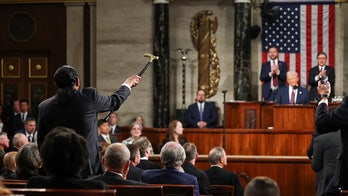Fox News Flash top headlines for June 15
Fox News Flash top headlines are here. Check out what's clicking on Foxnews.com.
The Supreme Court released its decision in a case involving a Trump-era immigration rule, declaring that they should not have taken the case in the first place.
The case, Arizona v. City and County of San Francisco, involved 13 states that intervened in a case to defend the "public charge rule," which stated that the U.S. can refuse to accept immigrants or grant green cards to those who are "likely at any time to become a public charge." The rule was put into effect by the Department of Homeland Security under former President Donald Trump.
A number of Democrat-leaning states and cities, including San Francisco, had refused to enforce the Trump policies on public charge, and had brought their own lawsuits. After President Biden took office, his administration opted not to defend the rule, then repealed it by relying on a lower court ruling in a separate case as a reason for why they did not have to go through the standard notice and comment period.
"These maneuvers raise a host of important questions. The most fundamental is whether the Government’s actions, all told, comport with the principles of administrative law," Chief Justice Roberts wrote in an opinion concurring with the court’s decision. "But bound up in that inquiry are a great many issues beyond the question of appellate intervention on which we granted certiorari[.]"
Those other issues, Roberts said, include standing, mootness, and whether the Administrative Procedure Act even allows a district court "to vacate regulations or other agency actions on a nationwide basis."
"It has become clear that this mare’s nest could stand in the way of our reaching the question presented on which we granted certiorari, or at the very least, complicate our resolution of that question," Roberts added.
Read the opinion
"The writ of certiorari is dismissed as improvidently granted," was the sole sentence in the Supreme Court's official, unsigned order.
The "public charge" has been a long-standing concept in immigration law. It refers to someone deemed likely to rely on government assistance and is a condition for denying someone immigration status.
The Trump administration introduced a "public charge" rule in 2019 that expanded the definition of "public charge" to include an immigrant who receives one or more designated public benefits for more than 12 months within a 36-month period.
As a result of the court’s action on Wednesday, the Public Charge Rule remains repealed, as the lower court, the Ninth Circuit Court of Appeals, denied the states’ motion to intervene and defend the rule in a decision issued in April 2021.
CLICK HERE TO GET THE FOX NEWS APP
In February of this year, the Department of Homeland Security proposed a new "public charge" rule that would dramatically scale back the number of benefits legal immigrants can use that would be held against them when applying for permanent residency in the United States, including food stamps and Medicaid.
"Under this proposed rule, we will return to the historical understanding of the term ‘public charge,’ and individuals will not be penalized for choosing to access the health benefits and other supplemental government services available to them," Homeland Security Secretary Alejandro Mayorkas said in a statement at the time.
Fox News' Adam Shaw, Shannon Bream, and Bill Mears contributed to this report.


















































